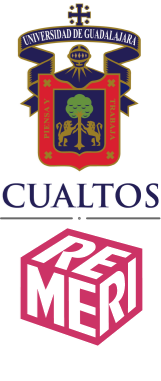Please use this identifier to cite or link to this item:
http://repositorio.cualtos.udg.mx:8080/jspui/handle/123456789/1563| Title: | Efectos de la COVID-19 en el proceso de aprendizaje de estudiantes universitarios |
| Other Titles: | Effects of COVID-19 on the learning process of university students. |
| Authors: | Islas Torres, Claudia Franco Casillas, Sergio Carranza Alcántar, María del Rocío |
| Keywords: | efectos del COVID-19 aprendizaje método holopráxico estudiantes universitarios performance indicators liquidity solvency management cost effectiveness |
| Issue Date: | Jun-2023 |
| Publisher: | Universidad San Gregorio de Portoviejo |
| Citation: | Islas Torres, C. ., Franco Casillas, S. ., & Carranza Alcántar, M. del R. . (2023). Efectos de la COVID-19 en el proceso de aprendizaje de estudiantes universitarios. Revista San Gregorio, 1(54), 98–114. Recuperado a partir de https://revista.sangregorio.edu.ec/index.php/REVISTASANGREGORIO/article/view/2452 |
| Series/Report no.: | Revista San Gregorio;Vol. 1, Núm. 54, (82023) 98–114. |
| Abstract: | Resumen Derivado de los impactos ocasionados por la pandemia COVID-19 en el ámbito de las universidades durante los años 2020, 2021 e inicios de 2022, se expone el presente artículo como resultado de una investigación que tuvo por objetivo: explicar los efectos de la COVID-19 en el proceso de aprendizaje de estudiantes universitarios del Centro Universitario de los Altos de la Universidad de Guadalajara. El abordaje fue estructurado y siguió el método de investigación holopráxico, desde el que se configuró un estudio de nivel comprensivo, explicativo, de temporalidad transversal. Para la recolección de la información se utilizó un cuestionario cuyo valor de Alfa de Cronbach fue de 0.968. Para analizar la relación entre las dimensiones del proceso, se utilizaron técnicas cuantitativas. Los resultados indicaron que durante la pandemia para que un estudiante se mantuviera motivado, interesado y atento dependía de su interés en el aprendizaje y no propiamente del uso de tecnologías. Los hallazgos son aporte al campo del conocimiento del aprendizaje, puesto que escasamente la literatura informa con detalle lo ocurrido durante la pandemia y a pesar de que parece haberse superado tal situación, se considera pertinente saber de los estragos que ésta representó en el aprendizaje de los estudiantes y así prever acciones sobre futuros acontecimientos. Abstract Derived from the impacts caused by the COVID-19 pandemic in the field of universities during the years 2020, 2021 and the beginning of 2022, this article is presented as a result of an investigation whose objective was: to explain the effects of COVID-19. 19 in the learning process of university students of the University Center of Los Altos of the University of Guadalajara. The approach was structured and followed the holopraxic research method, from which a comprehensive, explanatory level study of transversal temporality was configured. For the collection of information, a questionnaire was used whose Cronbach's Alpha value was 0.968. To analyze the relationship between the dimensions of the process, quantitative techniques were used. The results indicated that during the pandemic, for a student to remain motivated, interested, and attentive, it depended on her interest in learning and not on the use of technology itself. The findings are a contribution to the field of learning knowledge, since the literature rarely reports in detail what happened during the pandemic and despite the fact that this situation seems to have been overcome, it is considered pertinent to know about the havoc that it caused in student learning. and thus anticipate actions on future events. |
| Description: | Artículo |
| URI: | http://repositorio.cualtos.udg.mx:8080/jspui/handle/123456789/1563 |
| ISSN: | 1390-7247 print 2528-7907 online |
| Appears in Collections: | 6104 Artículos |
Files in This Item:
| File | Description | Size | Format | |
|---|---|---|---|---|
| Efectos de la COVID-19 en el proceso de aprendizaje de estudiantes universitarios.pdf | Documento | 466.72 kB | Adobe PDF | View/Open |
| Enlace a_Efectos de la COVID-19 en el proceso de aprendizaje de estudiantes universitarios.htm | Enlace a publicación | 46.06 kB | HTML | View/Open |
Items in DSpace are protected by copyright, with all rights reserved, unless otherwise indicated.


